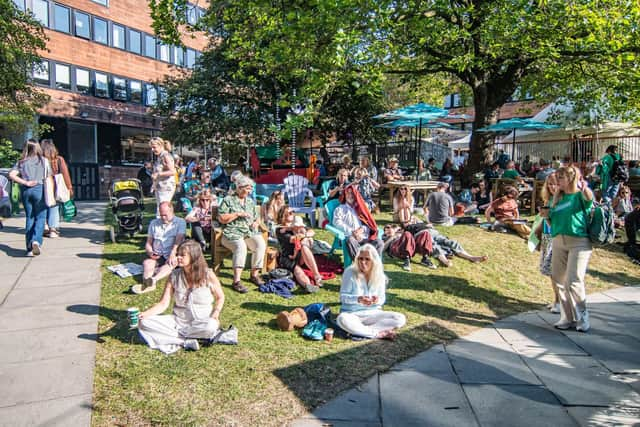Edinburgh International Book Festival strikes right tone with plea for calm - Brian Ferguson
and live on Freeview channel 276
It says a lot for Edinburgh’s festivals that I can hardly recall a serious incident of note in almost 30 years of attending them.
There is something remarkable about the fact a city can play host to the biggest event of its kind in the world without anything of note troubling the police.
Advertisement
Hide AdAdvertisement
Hide AdAudiences are almost universally good-natured and enthusiastic, while the people of Edinburgh, when they are not attending events themselves, seem either relaxed or cheerfully resigned over the annual invasion of their city.


When dark clouds have appeared, most notably over the prospect of Edinburgh being targeted by terrorists after incidents in London, Manchester and Glasgow over the past 20 years, festival audiences have been largely unaffected.
However, last year the Edinburgh International Book Festival had to grapple with the aftermath of one of the most shocking attacks ever made on a writer.
Salman Rushdie, a regular guest at Scotland’s biggest literary event, was fortunate to survive being stabbed multiple times shortly before he was due to give a lecture in New York.
Advertisement
Hide AdAdvertisement
Hide AdThe festival responded by inviting its guests to read a sentence from one of his books to start their events. Each time, the moment was memorable, emotional and sobering.
When I met with festival director Nick Barley this week, he told me how the attack on Rushdie had had a “big impact" on the confidence of audiences to return to the event, even though it had happened more than 3,000 miles away.
Almost a year on, Barley is understandably fully aware of the kind of criticism and the nature of the threats that writers, politicians and other high-profile figures face, much of it down to the “anger, brutality and toxicity” of social media.
Unveiling his programme, he positioned the festival as an “antidote” to social media’s worst excesses and a home for “listening as well as platforming”. In practice, this means bringing people together from different ends of the political spectrum to discuss and debate.
Advertisement
Hide AdAdvertisement
Hide AdBut of equal importance are the messages from Barley about finding a productive and constructive way for us to disagree with each other.
It was an appeal for calm ahead of what has the potential to be one of the most fractious seasons across Edinburgh's festivals landscape if the culture wars seep into venues and events.
The cancellation and reinstatement of Edinburgh MP Joanna Cherry’s “in conversation” appearance as part of the Stand Comedy Club’s Fringe programme undoubtedly created more divisions than it healed. The same can be said over Scottish Conservative leader Douglas Ross’s bizarre protests over the prospect of a drag queen’s storytelling event.
Other writers have raised repeated concerns about being “cancelled” or “silenced” by campaigners and activists deploying social media to discredit them.
Advertisement
Hide AdAdvertisement
Hide AdIt was probably no coincidence that just a few days before Mr Barley’s final festival launch, one of Scotland’s leading literary organisations issued a wide-ranging statement raising its own concerns about the “atmosphere” in parts of the literary world, the “singling out” of certain writers and the efforts to shut town their events.
It remains to be seen whether the admirable effort of Mr Barley and Scottish PEN will reduce the risk of writers being targeted for abuse or cancellation. But the conciliatory tone they have struck is undoubtedly a good place to start.
Comment Guidelines
National World encourages reader discussion on our stories. User feedback, insights and back-and-forth exchanges add a rich layer of context to reporting. Please review our Community Guidelines before commenting.
